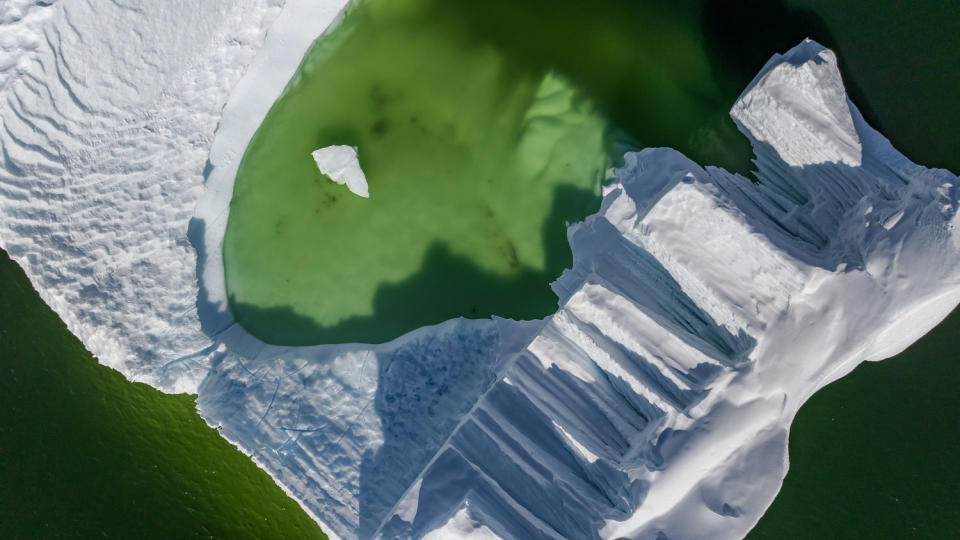Climate change is literally altering the Earth, new research suggests.
As polar and glacial ice melts due to global warming, water that was once concentrated in the upper and lower parts of the globe is being redistributed toward the equator. The extra mass around the center of the Earth slows down its rotation, which in turn has a lengthening effect in our days.
A new study offers further evidence of this dynamic and further suggests that changes in the planet’s ice were profound enough to affect Earth’s axis – the invisible line at its center around which it rotates. Together, these changes are causing feedback below the surface, affecting fluids moving in Earth’s molten core.
The findings were published in two journals, Nature Geoscience and Proceedings of the National Academy of Sciences, last week.
The studies, along with similar research published in Marchsuggest that humans have tinkered with fundamental elements of the planet’s physical properties – a process that will continue until some time after global temperatures stabilize and melting ice sheets reach an equilibrium.
“You can add Earth’s rotation to this list of things that humans have completely affected,” said one of the authors of the two new studies, Benedikt Soja, assistant professor of space geodesy at ETH Zurich in Switzerland.
The change in Earth’s rotation is significant enough that it could one day rival the influence of tidal forces caused by the Moon, Soja said — if carbon emissions continue at extreme levels.
In general, the speed of Earth’s rotation depends on the planet’s shape and where its mass is distributed – factors governed by several opposing forces.
Scientists often make a comparison to a figure skater spinning on ice: when skaters spin with their arms outstretched, their rotation will be slower. But if the skaters’ arms are held steady, they spin faster.
Similarly, ocean tidal friction caused by the Moon’s gravitational pull slows the Earth’s rotation. Historically, this has had the biggest influence on the planet’s rotation rate, Soja said.
Meanwhile, the slow recovery of the Earth’s crust in some high-latitude regions following the removal of Ice Age glaciers works in the opposite direction, accelerating the planet’s rotation.
Both processes have been predictable influences on Earth’s angular velocity.
But now, the rapid melting of ice due to global warming is becoming a powerful new force. If humans continue to pollute the planet with carbon emissions, Soja said, the influence of ice loss could outweigh the moon’s effect.
“In the worst-case scenarios, then yes, climate change would become the most dominant factor,” he said.

A fourth important factor that influences Earth’s rotation is the movement of fluid within its core. Scientists have long understood that this can speed up or slow down the planet’s rotation – a trend that can change every 10 to 20 years. Right now, the core is temporarily causing the Earth’s rotation to speed up slightly, counteracting the slowdown due to climate change.
Climate change also appears to be affecting the Earth’s core, as a result of melting ice and changes in the planet’s axis of rotation.
The researchers behind the new study built a 120-year model of polar motion, or how the axis changes over time. They found that changes in the planet’s mass distribution due to melting ice likely contributed to small fluctuations in polar motion.
Soja estimated that climate change was likely responsible for 1 meter of change over 10 years.
The research also suggests that the movement of molten rock within the Earth adjusts to changes in its axis and rotation rate – a feedback process in which the Earth’s surface influences its interior.
“The rotation changes slightly and this, we believe, may have an indirect effect on the nucleus,” said Soja. “That’s something that’s not very easy or impossible to measure directly because we can’t go there.”
The findings have implications for the way humans keep time and the way we position satellites in space.
“If you want to fly a new mission to Mars, for example, we really need to know exactly what the state of the Earth is in space, and if that changes, we could actually make a mistake or navigation error,” Soja said.
A change of 1 meter in the Earth’s axis, for example, could mean that a spacecraft misses its target by 100 or 1,000 meters when it arrives at Mars.
As for timing, the research published in March suggested that climate change has delayed the need to add a “negative leap second” to Coordinated Universal Time to keep world clocks aligned with the Earth’s rotation.
Duncan Agnew, a geophysicist at the Scripps Institution of Oceanography at the University of California, San Diego, who led the previous study, said the new research “fits very well” with his work.
“It extends the result even further into the future and looks at more than one climate scenario,” said Agnew, adding that although Soja and his co-authors took a different approach, they arrived at a result similar to his.
“Multiple discoveries are almost the rule in science – this is yet another case,” said Agnew.
Thomas Herring, a professor of geophysics at the Massachusetts Institute of Technology who was not involved in either study, said the new research may actually offer insight into how changes to Earth’s surface can influence what goes on inside it. .
“For feedback between surface processes and the core, I find this plausible,” Herring said via email, explaining that “large-scale” processes at the surface can “penetrate into the fluid core.”
This article was originally published in NBCNews. with


























/cdn.vox-cdn.com/uploads/chorus_asset/file/25406817/STK051_TIKTOK_CVirginia_B.jpg?w=300&resize=300,300&ssl=1)



